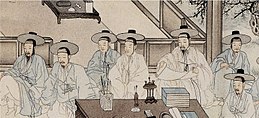
Back ثقافة كوريا الجنوبية Arabic দক্ষিণ কোরিয়া#সংস্কৃতি Bengali/Bangla Cultura de Corea del Sur Spanish فرهنگ در کره جنوبی Persian Culture de la Corée du Sud French दक्षिण कोरिया की संस्कृति Hindi Հարավային Կորեայի մշակույթ Armenian Kebudayaan Korea Selatan ID სამხრეთი კორეის კულტურა Georgian 대한민국의 문화 Korean
 |
| Part of a series on the |
| Culture of Korea |
|---|
| Society |
| Arts and literature |
| Other |
| Symbols |
|
This article includes a list of references, related reading, or external links, but its sources remain unclear because it lacks inline citations. (November 2022) |
This article's tone or style may not reflect the encyclopedic tone used on Wikipedia. (December 2022) |
The contemporary culture of South Korea developed from the traditional culture of Korea which was prevalent in the early Korean nomadic tribes. By maintaining thousands of years of ancient Korean culture, with influence from ancient Chinese culture, South Korea split on its own path of cultural development away from North Korean culture since the division of Korea in 1945. The industrialization, urbanization and westernization of South Korea, especially Seoul, have brought many changes to the way Korean people live. Changing economics and lifestyles have led to urbanization—a concentration of population in major cities (and depopulation of the rural countryside), with multi-generational households separating into nuclear family living arrangements. Today, many cultural elements from South Korea, especially popular culture, have spread across the globe and have become some of the most prominent cultural forces in the world.[1][2][3][4][5]
- ^ Yong Jin, Dal (Fall 2012). "Hallyu 2.0: The New Korean Wave in the Creative Industry". International Institute Journal. 2 (1). hdl:2027/spo.11645653.0002.102.
- ^ Farrar, Lara. "'Korean Wave' of pop culture sweeps across Asia". Archived from the original on 2014-01-06. Retrieved 2018-02-05.
- ^ Cheon, Sang Yee (2015). "The Global Impact of South Korean Popular Culture: Hallyu Unbound ed. by Valentina Marinescu (review)". Korean Studies. 39 (1): 113–114. doi:10.1353/ks.2015.0005. S2CID 162503679. Gale A441492154 Project MUSE 609019 ProQuest 1760327776.
- ^ Kim, Harry (2 February 2016). "Surfing the Korean Wave: How K-pop is taking over the world | The McGill Tribune". The McGill Tribune. Archived from the original on 23 November 2018. Retrieved 5 February 2018.
- ^ Duong, Nguyen Hoai Phuong (2016). Korean Wave as Cultural Imperialism: A study of K-pop Reception in Vietnam (Thesis). hdl:1887/37300.
© MMXXIII Rich X Search. We shall prevail. All rights reserved. Rich X Search